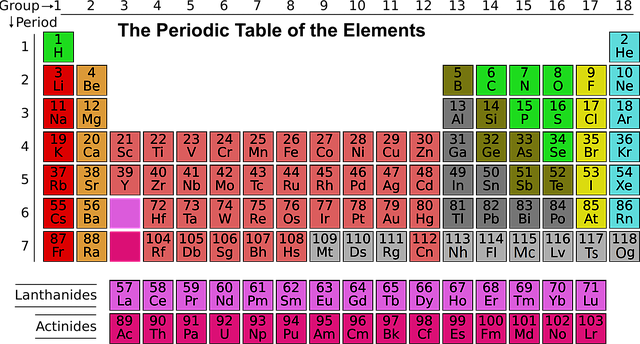Minerals
Minerals are essential elements (yes the ones in the periodic table!) required for the maintenance of optimal health.

We need some (but not all!) of the basic elements to nourish our cells and organs.
The minerals are divided into Macro and Micro Minerals. The Macro minerals are required in doses of over 100 milligrams (mg) per day. The Micro minerals (or trace minerals) are required in much smaller doses.
| Mineral | Functions | RDA | Top Food Sources |
|---|---|---|---|
| Calcium | Mineralisation of Bone and Teeth, Cell Signalling, Blood Pressure Control, Nerve Signal Transmission, Muscle Contraction | 850- 1300 mg/d for Adults | Tofu, Sardines, Dairy, White Beans, Greens |
| Chromium | Assists the action of Insulin in controlling Blood Glucose Levels | No RDA established but Adequate Intake (AI) levels are set 20 – 45 ug/d | Whole Grains, Beans, Nuts, Broccoli, Eggs |
| Copper | Helps release Iron from storage (energy production), Involved in Connective Tissue formation (Collagen and Elastin), Essential for Neurotransmitter production and Nerve Health, Necessary for Antioxidant Function | 900 – 1600 ug/d for adults | Oysters, Crab Meat, Cashews, Almonds, Peanuts, Sunflower Seeds, Hazelnuts, Lentils, Mushrooms |
| Fluoride | A somewhat controversial nutrient – some consider it is not essential. Strengthens Bones and Teeth. Helps to prevent Tooth Decay | No RDA is established – Adequate Intake is considered to be 3 – 4 mg/d | Crab Meat, Sardines, Grape Juice, Tea, Fluoridated Water |
| Iodine | Essential for Thyroid Hormone Production – Thyroid hormone effects Growth and Development, Reproduction and Metabolism (how fast our cells work) | RDA for Adults is between 150 and 290 ug/d for Adults depending on status (Higher in Pregnancy and Breastfeeding) | Seaweed, Seafood, Cows Milk, Baked Potato, Turkey, Haricot Beans (also known as Navy Beans – the ones used in tinned Baked Beans |
| Iron | Energy Production via Oxygen Transport, Antioxidant (protects cells) as well as Oxidiser for the Immune system (helps kill pathogens), DNA repair and Replication | For Adults 8 – 28 mg/d depending on status | Meat, Fish, Greens, Lentils, Tofu, Beans |
| Magnesium | Energy Production, Protein, DNA & Antioxidant Synthesis, Structural part of Bone, Cell Membranes and Chromosomes, Needed for Nerve Impulses, Heart and Muscle Contractions, also involved in Cell Signalling and Wound Healing | 300-400 mg/day for Adults | Greens, Whole Grains, Nuts, Beans, Chickpeas |
| Manganese | Mitochondial Antioxidant, Energy Metabolism, Assists in Bone & Cartilage formation, Required for wound healing | No RDA – AI is 1.8 to 3 mg/day for Adults | Oats, Brown Rice, Whole Wheat, Nuts, Beans, Greens, Tea |
| Molybdenum | Required for multiple enzymes in the body: Metabolising Sulfer containing Amino Acids, Assists Antioxidant Function, Assists metabolism of toxins | 45 – 65 ug/day for Adults | Beans, Lentils, Peas, Grains and Nuts |
| Phosphorus | Structural molecule in Bone, Major component in all cell membranes, Key element in Energy Storage & Production (ATP), Forms part of the DNA molecule, Required for Enzymes, Hormones and Cell Signalling activities, Helps maintain Acid / Base Balance in Blood, Regulated Oxygen delivery | 700 – 1250 mg/day | Found in most foods – top ones are: Meat, Poultry, Salmon, Dairy, Lentils, Nuts, Grains |
| Potassium | Maintains Electrical Potential between interior and exterior of cells, Needed for Nerve Impulses, Muscle and Heart Contraction, Required for a number of Enzymes related to Energy Production | No RDA set – AI for Adults is 2600 – 3500 mg/day (2.6 – 3.5 grams/day) | Highest Food sources are Fruits and Vegetables: Potatoes, Apricots, Plums, Raisins, Squash, Banana, Spinach, Tomatos |
| Selenium | Critical for Antioxidant Function in the body, required for Thyroid hormone production: Metabolism and maintaining body temperature, Supports the Immune System | 55 – 70 ug/day for Adults | Brazil Nuts, Seafood, Meat, Brown Rice, Whole Wheat Bread, Sunflower Seeds |
| Sodium (Chloride) | Maintains Electrical Potential between interior and exterior of cells, Maintains Blood Pressure and Blood Volume | No RDA set for Sodium. Adequate Intake is set at 1500 mg/day (3.8 grams of salt / day) | Salt is added to many processed foods. Most people need be more concerned with too much intake rather than too little. All whole foods are relatively low in salt. Foods high in salt include processed meats, most processed foods, cheese, butter, soy sauce |
| Zinc | Zinc is an important component of multiple enzymes, is a structural component of multiple proteins including nuclear cell receptors – allowing the actions of Oestrogen, Thyroid hormone, Vitamins A & D, Also involved in Antioxidant function and regulation of Gene Expression | 8 – 13 mg/day for Adults | Shellfish, Red Meat, Nuts, Legumes, Soy Beans, Cashews, Sunflower Seeds, Dairy |
| Honorable Mentions | |
|---|---|
| This is a list of some elements / minerals that have some biological activity in the body, but either due to inadequate information or owing to the fact that some of these minerals are so ubiquitous in the environment that we have not seen anyone with a deficiency, they are not considered to be essential for humans | |
| Arsenic | Arsenic has been shown to be an essential element in some animals with deprivation studies finding negative impacts on growth and kidney function. Whether it is essential for humans is not clear. Although arsenic is ubiquitous in very small quantities, at higher levels it is a toxin and carcinogen. |
| Boron | No clear biological function has been identified in humans. Boron may help with growth and development, bone formation, brain and immune function. |
| Bromine | Involved in synthesis of Collagen – a tissue found throughout the body. |
| Lithium | Lithium has a moderating affect on mood and the nervous system |
| Nickel | Possible co-factor of enzymes involved in metabolic processes |
| Strontium | Involved in calcium uptake in bones, may help prevent rickets |

